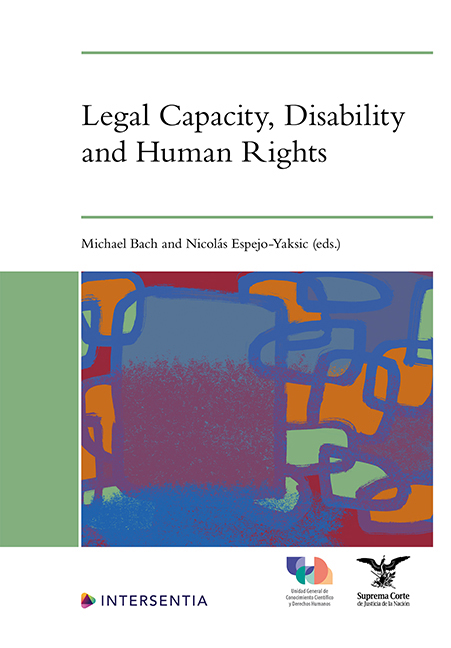Book contents
- Frontmatter
- Foreword
- Acknowledgements
- Contents
- List of Cases
- List of Contributors
- Legal Capacity, Disability and Human Rights: Introduction
- PART I HISTORICAL PERSPECTIVES AND THEORETICAL FRAMES
- PART II LAW REFORM: COUNTRY AND REGIONAL PERSPECTIVES
- PART III LEGAL QUESTIONS, PERSISTENT CHALLENGES
- Index
- About the Editors
A Critical Review of Legal Capacity Reform in the U.S.
Published online by Cambridge University Press: 03 April 2024
- Frontmatter
- Foreword
- Acknowledgements
- Contents
- List of Cases
- List of Contributors
- Legal Capacity, Disability and Human Rights: Introduction
- PART I HISTORICAL PERSPECTIVES AND THEORETICAL FRAMES
- PART II LAW REFORM: COUNTRY AND REGIONAL PERSPECTIVES
- PART III LEGAL QUESTIONS, PERSISTENT CHALLENGES
- Index
- About the Editors
Summary
INTRODUCTION
Legal capacity, generally – and mistakenly – understood as “mental capacity” is deeply ingrained in U.S. law, resulting in the denial of the human right of legal capacity to people with intellectual/developmental, psychosocial, and cognitive disabilities. The most common and visible legislative manifestations of this denial are guardianship laws, which apply primarily to persons with intellectual/ developmental disabilities and older persons with cognitive decline, dementia, etc., and involuntary commitment and medication laws affecting persons with psychosocial disabilities/mental illness. In addition to guardianship, there is a vast body of laws, regulations and judicial decisions that impose differing tests of mental capacity for such activities as contracting, marrying, voting, serving as a witness or juror, giving consent for health care treatment, making a will, etc., allowing private and public third parties, like doctors, bankers, landlords, voting commissioners and marriage licence clerks to deny legal capacity to persons with disabilities.
To date there has been little U.S. attention to the ways in which denial of legal capacity discriminates against persons with disabilities, and even less attention to any affirmative right to legal capacity. The U.S. has not ratified the UN Convention on the Rights of Persons with Disabilities (CRPD), consistent with a long history of antipathy to human rights conventions, and other than an ever-growing body of legal scholarship, there is no public awareness of, or discussion about it.
Current reforms implicating legal capacity are tied to the use of supported decision-making (SDM), itself inconsistently understood and defined. They take two forms: modest efforts to limit, but not repeal, guardianship laws through recognition of SDM as a “less restrictive alternative” to guardianship; and, more recently, laws recognising and regulating SDM Agreements (SDMAs) that purport to require legal recognition of decisions made pursuant to such agreements.
The impetus for even these limited efforts is mixed, resulting in the lack of any truly principled attack on substituted decision-making, and often leaving the door open for continuing imposition of mental capacity tests. In the absence of any popular movement advocates for the human right of legal capacity are almost all academic. with few exceptions, SDM advocates have pursued an incrementalist legislative strategy with few empirically based efforts to demonstrate how SDM might actually work “on the ground” .
- Type
- Chapter
- Information
- Legal Capacity, Disability and Human Rights , pp. 153 - 176Publisher: IntersentiaPrint publication year: 2023



